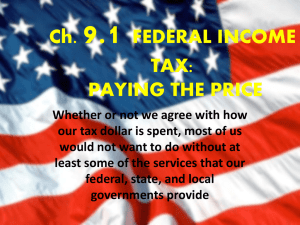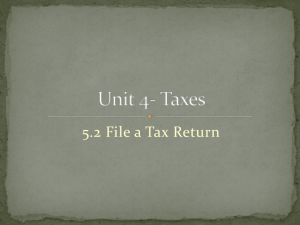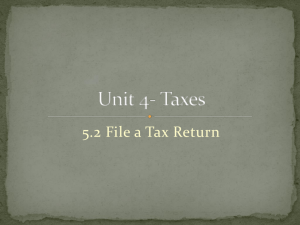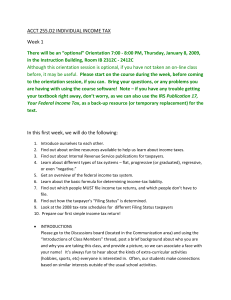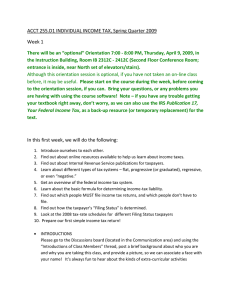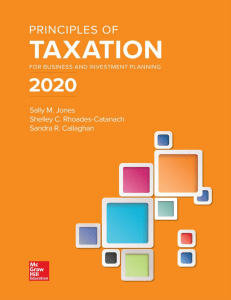Name Date Period A recent report states that Americans spend more on taxes...
advertisement
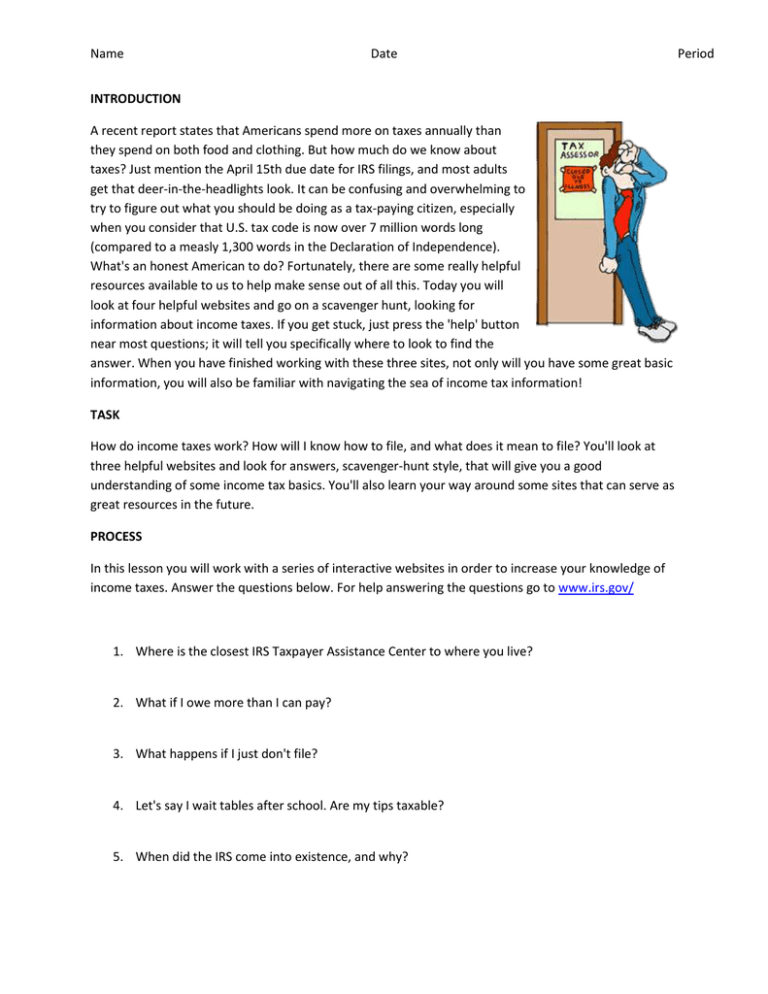
Name Date INTRODUCTION A recent report states that Americans spend more on taxes annually than they spend on both food and clothing. But how much do we know about taxes? Just mention the April 15th due date for IRS filings, and most adults get that deer-in-the-headlights look. It can be confusing and overwhelming to try to figure out what you should be doing as a tax-paying citizen, especially when you consider that U.S. tax code is now over 7 million words long (compared to a measly 1,300 words in the Declaration of Independence). What's an honest American to do? Fortunately, there are some really helpful resources available to us to help make sense out of all this. Today you will look at four helpful websites and go on a scavenger hunt, looking for information about income taxes. If you get stuck, just press the 'help' button near most questions; it will tell you specifically where to look to find the answer. When you have finished working with these three sites, not only will you have some great basic information, you will also be familiar with navigating the sea of income tax information! TASK How do income taxes work? How will I know how to file, and what does it mean to file? You'll look at three helpful websites and look for answers, scavenger-hunt style, that will give you a good understanding of some income tax basics. You'll also learn your way around some sites that can serve as great resources in the future. PROCESS In this lesson you will work with a series of interactive websites in order to increase your knowledge of income taxes. Answer the questions below. For help answering the questions go to www.irs.gov/ 1. Where is the closest IRS Taxpayer Assistance Center to where you live? 2. What if I owe more than I can pay? 3. What happens if I just don't file? 4. Let's say I wait tables after school. Are my tips taxable? 5. When did the IRS come into existence, and why? Period Name Date 6. What was the highest percentage income tax being paid in 1918? Why was it so high? 7. Look at Forms 1040A and 1040EZ. Which looks easier? Why? 8. Keep looking at the 1040A and EZ. According to the titles on the forms, who should use each form? 9. What's the purpose of a W-4 form? 10. What are the three important qualifications you must meet to be able to file a 1040EZ tax return? 11. How much is the standard deduction? 12. When should you itemize instead of claiming the standard deduction? 13. List three itemized deductions you could claim now or in the near future. Second Site Complete the following interactive activity. For help, go to www.salary.com What money is taxable and what is nontaxable? Go To: http://www.econedlink.org/interactives/EconEdLink-interactive-toolplayer.php?filename=em748_dragndrop_1.swf&lid=748 Drag and drop the following descriptions into the correct category: taxable or nontaxable. TAXABLE NONTAXABLE Period Name Date Period CONCLUSION If it was not for income taxes, we would not have a lot of the nice things the government provides using tax money, like roads, police, and schools. But enjoying the benefits of taxes does not make them any less confusing. Now you know some basic tax information, and you also are familiar with some sites you can refer to in the future when you need to find out more. Instructions: Match the following terms with their definitions. a. deduction b. dependent c. exemption d. standard deduction e. taxable income _____ 1. a set dollar amount that you don’t have to pay taxes on if you choose not to itemize _____ 2. a type of deduction for yourself or a dependent _____ 3. adjusted gross income minus any deductions or exemptions _____ 4. a dollar amount that is subtracted from income to determine taxable income _____ 5. someone who depends on a taxpayer – usually a child Instructions: Circle the letter of the best answer to the following questions. 6. What would happen if I didn’t file taxes? a. the first time, the IRS would file for you and you’d owe more than you would if you had filed yourself, plus penalties and interest b. the first time, the IRS would conduct an audit and you’d owe penalties and interest c. the first time, the IRS would probably overlook it, though if they caught it you’d face jail time, plus owe all the taxes and penalties and interest d. because of account software, it’s impossible to avoid filing taxes 7. Which is the shortest of the following tax forms? a. 1040 long form b. 1040EZ c. 1040A 8. Which amount is closest to the standardized deduction for this year? a. $100 b. $500 c. $5,000 d. $100,000 9. Which of the following IS taxable? a. interest on bank accounts b. childcare at work c. gifts d. most IRA contributions 10. Which of the following IS NOT taxable? a. unemployment compensation b. lottery and gambling winnings c. tips d. child support receive
